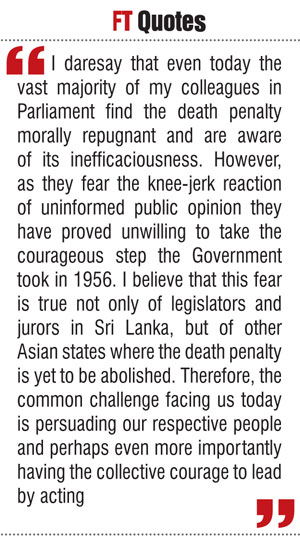Thursday Feb 26, 2026
Thursday Feb 26, 2026
Saturday, 25 June 2016 00:00 - - {{hitsCtrl.values.hits}}

 Foreign Minister Mangala Samaraweera’s addressing the Sixth World Congress Against the Death Penalty
Foreign Minister Mangala Samaraweera’s addressing the Sixth World Congress Against the Death Penalty
Despite its widespread use, for millennia the death penalty has caused lingering societal discomfort and unease. Fairly early on in history many enlightened leaders have found the death penalty degrading of human dignity. For example, in ancient Sri Lanka a number of kings – influenced by the Buddha’s teaching – abolished the death penalty. In fact, for much of the first, third, fourth and thirteenth centuries the death penalty was not employed in Sri Lanka.
This may help explain why for nearly a century there has been a consensus among the legislative leadership of my country that the death penalty ought to be abolished. This consensus was based both on moral grounds and on the ineffectiveness of the death penalty as a deterrent.
As far back as 1928 the Ceylon Legislative Assembly voted 19 to seven in favour of a resolution on abolishing the death penalty, which was moved by D.S. Senanayake, who became the first Prime Minister of Ceylon and founder of the United National Party – one of Sri Lanka’s two main political parties. In the end, abolition was only thwarted by the high-handedness of the colonial authorities of the time.
In 1956, a few years after Independence, my father, then the Parliamentary Secretary for Justice, proposed a bill ending capital punishment which was supported by S.W.R.D. Bandaranaike, the Prime Minister and founder of the Sri Lanka Freedom Party - our island’s other main political party. The bill passed but tragically the death penalty was resumed a few years later as result of Bandaranaike’s assassination until a de facto moratorium was instituted in 1976.
I daresay that even today the vast majority of my colleagues in Parliament find the death penalty morally repugnant and are aware of its inefficaciousness. However, as they fear the knee-jerk reaction of uninformed public opinion they have proved unwilling to take the courageous step the Government took in 1956. I believe that this fear is true not only of legislators and jurors in Sri Lanka, but of other Asian states where the death penalty is yet to be abolished.
Therefore, the common challenge facing us today is persuading our respective people and perhaps even more importantly having the collective courage to lead by acting.
However, changing public opinion is a time-consuming and resource intensive process. And the evidence points out that, despite persistent advocacy, public opinion on the subject of the death penalty is relatively static in many countries. Therefore, overcoming this key challenge requires an act of political courage.
Studies have shown that when people are asked to sit in mock judgement, rather than simply answer survey questions, no more than 30% of people support the death penalty, even in the most serious of cases. In France, although public opinion was overwhelmingly in favour of the death penalty in 1981, its abolition decided by the then President of France led to a change of public opinion.
It is clear that the debate resulting from the process of abolishing the death penalty and the lack of change in crime rates after the death penalty has been abolished allays the public’s fears. As a result there have been very, very few cases of reversal once the death penalty is abolished.
Momentum is slowly building in Asia, where more executions take place than the rest of the world combined. In South-East Asia the number of executions has declined significantly, in South Asia there have been both short and long de facto moratoria. In 2007, 24 Asian states voted against the UN Resolution on a Death Penalty Moratorium, in 2014 that number had declined to 18.
There is further good news: Sri Lanka’s Minister of Justice, who will also be addressing a session at this Conference, has informed Parliament that Sri Lanka will return to its traditional position of voting in favour of this resolution as it did in 2007, 2008 and 2010 and, more importantly, continuing the four decades long de facto moratorium.
Allow me to conclude by saying that abolishing the death penalty requires persuasion and resolve but above all it requires leadership – the collective leadership of legislators, activists, editors, academics and jurors. As momentum towards critical mass develops, I am confident that the coming years will see the death of the death penalty in our region.